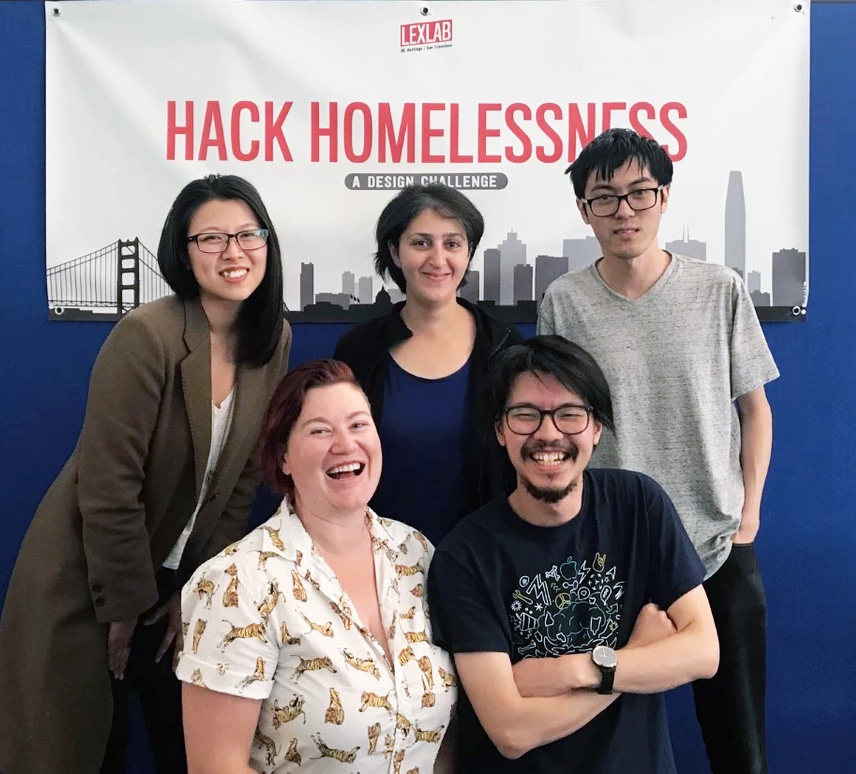Hack Homelessness: a Design Challenge
A three-part initiative sponsored by LexLab at UC Hastings Law
Virtual Design Challenge/Hackathon is an annual event that is a component of Hack Homelessness, a Design Thinking-based course taught at the UC Hastings Law School in San Francisco. The course studies the homeless population’s lack of access to legal services. Topics identified in the course serve as design challenges for interdisciplinary teams that comprise of lawyers, developers, architects, designers, builders, and thinkers during a week-long design charrette during November 8-13, 2020. The design proposals will be presented on a demo day on November 14th 2020 and the finding published subsequently.
This year, this event will be held virtually and ARH students are invited to participate at the invitation of Charles Green. Charles is an Oakland-based architect and an ARH faculty member who involved in organizing this event.
Work by the teams will begin on Sunday November 8th and the presentation of ideas/prototypes before a panel of judges will be on Saturday November 14th. That space of time should allow teams to organize their own schedules around everyone’s work (and other) commitments to spend time together periodically during that week. For this year’s event, topics identified so far by the law students are Eviction, Zoning, Encampments, Confronting NIMBY-ism.
There will be a preliminary session on Wednesday October 14th to brainstorm topics and form teams. Additional details are forthcoming.
All ARH students and alumni are invited to participate. Please reach out to Charles Green and Karen Seong to express interest.
Hack Homelessness 2019 Summary
Following is a summary of the 2019 Hackathon Event from LexLab at UC Hastings
We also had a new and particularly exciting event this semester as part of the Hack Homelessness initiative. Our first ever Hack Homelessness event took place at the end of October, and was a hackathon focused on the legal issues facing people experiencing homelessness in San Francisco. A diverse group of approximately 60 people joined us to work collaboratively in search of solutions to some of the legal issues confronting those experiencing homelessness. Participants formed teams that included UC Hastings law students, software engineers, architects, legal tech product developers, UX designers, as well as many others. Most were residents of the Bay Area but we also had an attendee from Australia, and several from other parts of the US.
The work of the teams was also made possible by the mentors who came and acted as a resource for participants. We want to extend a special thank you from the members of IDEO, the engineers of Make School and OneDegree, and the representative from the SF Bar’s Conflict Intervention Service, all of whom provided valuable information to the participants.
We also had a terrific panel of judges: Lawrence Grodeska founder of Civic Makers, Sameena Kluck, Head of Business Development for Paladin, a legal tech startup, Anel Muller, Design Operations Lead for Paypal, and Gloria Chun, Director of Pro Bono Projects at the Justice and Diversity Center. After an in-depth discussion, the judges announced that the winner of Hack Homelessness was “Refuge”, a team focused on extending the five-day window that tenants are given to respond to their landlord’s intention to formally evict them. Tenants who do not respond within that time period are issued a non-appealable Final Notice of Eviction.
Comprised of Linden Chiu, Melody Liu, Matt Mo, Sima Ohadi, Hans Paul Pizzinini, and Randi Willis, the Refuge team delivered a concise and informative presentation that clearly outlined the problem they wanted to solve (the short time period given tenants to formally respond to the court after receiving notice from their landlord) and their solution to that problem. As winners of the hackathon, Refuge received the prize of $1000 to be donated to the service provider of their choice. The team chose to direct their donation to the Housing Advocacy division of Arc San Francisco, which provides assistance in finding homes and developing new housing options for individuals with developmental disabilities.
The judges awarded second place to “Food Do-Gooders”, a team that developed a website to encourage restaurants with excess food at the end of the business day to donate that food to nonprofits that serve the homeless and hungry in San Francisco. This team was comprised of Chiara Iacopelli, Ana Dragojevic, Maria De Florencia, Courtney Chew, Marta Armenteros, Penelope Barr, Joshua Wong, Gregory Han, Lassarina Ho, Musa Akbari, and Ernesto Diaz.
Hack Homelessness was a huge success: one student wrote “I think this class was incredibly valuable. There is no doubt in my mind that law school should include innovative classes like this one that emphasize collaboration, compassion and creativity. It is a breath of fresh air for those of us who want to tackle systemic inequality outside of the courtroom.” One of the software engineers said “I have been to many other hackathons, but this one has meant the most to me.”
Past year partners have included IDEO a global design company, Make School a university, SF Legal Hackers a volunteer-based legal problem solvers, Paladin a legal tech startup.

